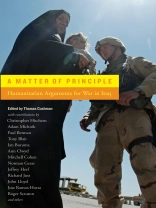Current debate over the motives, ideological justifications, and outcomes of the war with Iraq have been strident and polarizing. A Matter of Principle is the first volume gathering critical voices from around the world to offer an alternative perspective on the prevailing pro-war and anti-war positions. The contribu-tors—political figures, public intellectuals, scholars, church leaders, and activists—represent the most powerful views of liberal internationalism. Offering alternative positions that challenge the status quo of both the left and the right, these essays claim that, in spite of the inconsistent justifications provided by the United States and its allies and the conflict-ridden process of social reconstruction, the war in Iraq has been morally justifiable on the grounds that Saddam Hussein was a brutal tyrant, a flagrant violator of human rights, a force of global instability and terror, and a threat to world peace.
The authors discuss the limitations of the current system of global governance, which tolerates gross violations of human rights and which has failed to prevent genocide in places such as Bosnia and Rwanda. They also underscore the need for reform in international institutions and international law. At the same time, these essays do not necessarily attempt to apologize for the mistakes, errors, and deceptions in the way the Bush administration has handled the war. Disputing the idea that the only true liberal position on the war is to be against it, this volume charts an invaluable third course, a path determined by a strong liberal commitment to human rights, solidarity with the oppressed, and a firm stand against fascism, totalitarianism, and tyranny.
Spis treści
Acknowledgments
Introduction: The Liberal-Humanitarian Case for the War in Iraq
Thomas Cushman
PART ONE RECONSIDERING REGIME CHANGE
1 The Case for Regime Change
Christopher Hitchens
2 Liberal Legacies, Europe’s Totalitarian Era, and the Iraq War: Historical Conjectures and Comparisons
Jeffrey Herf
3 'Regime Change’: The Case of Iraq
Jan Narveson
4 In the Murk of It: Iraq Reconsidered
Mitchell Cohen
PART TWO PHILOSOPHICAL ARGUMENTS
5 National Interest and International Law
Roger Scruton
6 Just War against an 'Outlaw’ Region
Mehdi Mozaffari
7 Moral Arguments: Sovereignty, Feasibility, Agency, and Consequences
Daniel Kofman
PART THREE CRITIQUES OF THE LEFT
8 A Friendly Drink in a Time of War
Paul Berman
9 Wielding the Moral Club
Ian Buruma
10 Peace, Human Rights, and the Moral Choices of the Churches
Mient Jan Faber
11 Ethical Correctness and the Decline of the Left
Jonathan Rée
12 Pages from a Daily Journal of Argument
Norman Geras
13 Liberal Realism or Liberal Idealism: The Iraq War and the Limits of Tolerance
Richard Just
PART FOUR EUROPEAN DIMENSIONS
14 Iraq and the European Left
John Lloyd
15 Guilt’s End: How Germany Redefined the Lessons of Its Past during the Iraq War
Richard Herzinger
16 The Iraq War and the French Left
Michel Taubmann
17 Tempting Illusions, Scary Realities, or The Emperor’s New Clothes II
Anders Jerichow
PART FIVE SOLIDARITY
18 Antitotalitarianism as a Vocation: An Interview with Adam Michnik
Thomas Cushman and Adam Michnik
19 Sometimes a War Saves People
Jose Ramos-Horta
20 Gulf War Syndrome Mark II: The Case for Siding with the Iraqi People
Johann Hari
21 'They Don’t Know One Little Thing’
Pamela Bone
22 'Why Did It Take You So Long to Get Here?’
Ann Clwyd
PART SIX LIBERAL STATESMANSHIP
23 Full Statement to the House of Commons, 18 March 2003
Tony Blair
[24 The Threat of Global Terrorism
Contributors
Index
O autorze
Thomas Cushman is Professor of Sociology at Wellesley and Editor in Chief of The Journal of Human Rights. He is coeditor of George Orwell into the Twentieth Century (2004) and editor of The Time We Knew: Western Reponses to the War in Bosnia (1996).












